Urban activists hack their way toward open government
Oakland partners with Code for America, but how much difference can tech make?
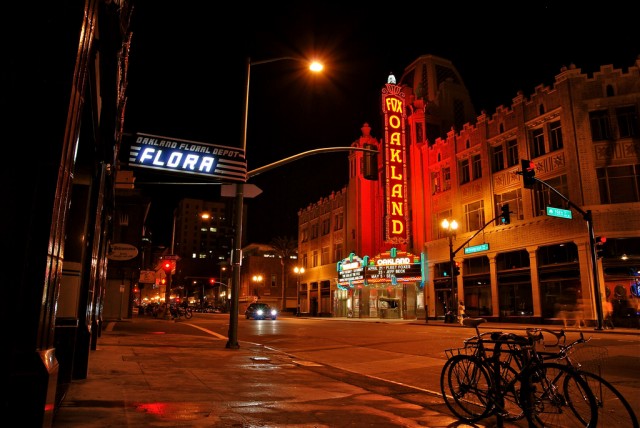
Blocks away from Oakland's Fox Theater, in City Hall, groups of hackers are trying to help the city, one line of code at a time.
It's an apt comparison. All three organizations choose a specific municipal problem and recruit volunteers with specific skillsets—in this case, people able to conceptualize and build some sort of tech tool—to tackle it. Accordingly, the past two years of the CFA program have produced a few high profile successes: "BlightStatus" in New Orleans lets people check up on blight in their neighborhoods, while "Honolulu Answers" in Hawaii refined search on the municipality's websites. In Boston, the CFA was responsible for both "Where's My School Bus?", which provides real-time school bus information for parents, and "Adopt-A-Hydrant," which helps the city save money by letting people volunteer to shovel hydrants near their homes out of the snow in the winter.
Any city can apply to host CFA fellows. If successful, the paid fellows spend a month in the chosen cities, then head back to CFA’s headquarters in San Francisco to regroup, code, and work on their projects. The third crop of CFA fellows will disperse all across the country in 2013 to Louisville, Kentucky; Kansas City, Kansas; Kansas City, Missouri; Las Vegas, Nevada; New York City, New York; South Bend, Indiana; San Mateo, California; San Francisco, California; Summit County, Ohio; and Oakland, California.
This year's planning is already underway. Oakland city officials came to an agreement with their three Code for America fellows just last week. The fellows will spend the year developing a “public records request portal,” hoping to alleviate an overwhelming problem for city government employees.
“Ultimately, what we’d like to do is have a shared view of requests, both current and past, and [include] what the status is of what’s going on. That way, people from the community can see what’s going on and city staff can see who has [the public records request] and where it’s been routed to,” Cris Cristina, a current Oakland CFA fellow, told Ars.
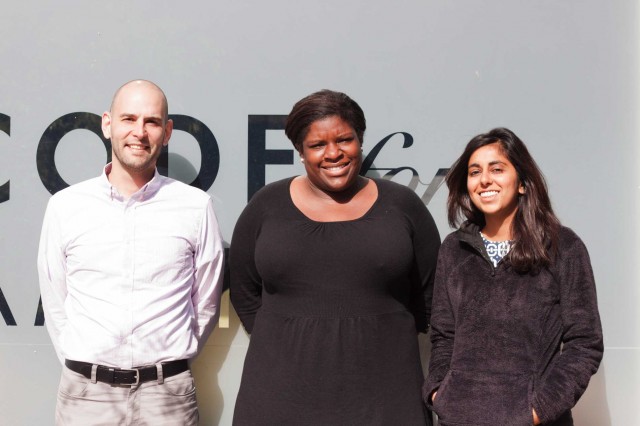
Enlarge / Cris Cristina (left), Sheila Dugan (center), and Richa Agarwal (right), are the three fellows assigned to Oakland this year.
Oakland sits in the geographic center of the tech-focused Bay Area with the University of California, Berkeley right next door. The city already has a new co-working space called Tech Liminal and an even newer hackerspace, called Sudoroom. (Disclosure: I am a paying member at Sudoroom.) There are a slew of well-educated, well-intentioned, civic-minded hackers and hacktivists outside of the CFA program that also want to make Oakland better through technology. In fact, there's a well-organized and consistent digerati set that have a standing weekly “hack night” on the ground floor of City Hall.
But the reality is that Oakland doesn't yet have the level of tech culture that exists elsewhere in the Bay Area. Pandora and Ask.com are the only local household-name tech companies. And while conditions in downtown and uptown Oakland (a handful of blocks away from each other) are improving, huge swaths of the city remain hamstrung by poor schools, slow economic development, and frustrating policing.
City officials see CFA and other parallel hacktivist projects, like OpenOakland, as a welcome (and low-cost) effort to aid a city under strain. They don’t expect technology to solve all of the Oakland’s problems, but they believe it might alleviate a small portion of the city’s challenges. And something is better than nothing.
“Having this system will help bring to light what people are looking for,” said Nicole Neditch from the Office of the City Administrator. She's been the CFA fellows’ primary contact to the city. “It can help identify what people are interested in and make [those records] available. That’s absolutely part of what we’re talking about. It’s access to information.”
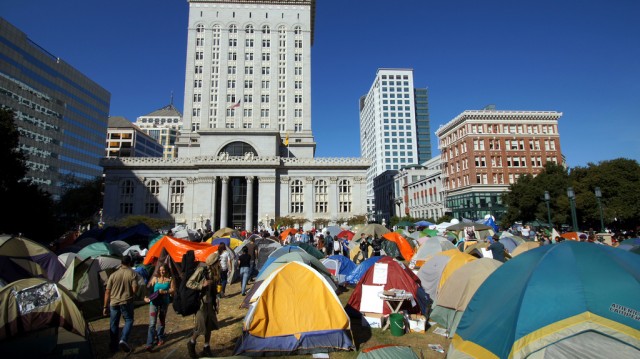
Enlarge / Occupy Oakland consumed a lot of the city's attention toward the end of 2011.
Oakland after “Occupy”
The problem CFA will address in Oakland—public information requests—is by no means new. In fact, Oakland already has an online interface for submitting such requests, but it doesn’t have an obvious way to monitor the status of each one, and Oakland has no way of tracking requests made offline, on paper. When asked, Neditch couldn't even say how many total public records requests were pending.“Part of the problem that we have is that we don’t have a good way of tracking public records requests right now,” she admitted. “My job is to return that record to you as quickly as possible. I have that responsibility as a city employee. But we don’t have all employees set up on the records request system. One of the goals that we hope to get out of this project is to get clear metrics. Actually, right now we don’t have clear metrics. You [can submit a request by] phone, e-mail, by text, in person—a lot of records are requested in person and are fulfilled right there.”
Local data activists (and even city officials) recognize this issue dates back to Oakland's participation in the Occupy Wall Street protests two years ago. In the fall of 2011, this stubborn, proud, working-class city that I call home was swept up in the Occupy movement. After nearly a month of protests and public demonstrations, hundreds of police were dispatched to disperse crowds assembled outside city hall.
Tempers flared during the protests. Protesters camped outside city hall, windows were broken, and police arrested marchers and filled the streets with tear gas. Local resident and Iraq war veteran Scott Olsen was hit in the front of the head with a bean bag round fired at close range. By the time it was all over, people wanted to know what had really happened.
Within days, around 50 citizens and organizations filed public records requests, including the American Civil Liberties Union and the “Occupied Oakland Tribune.” To its credit, the city has released a number of videos and other written materials in relation to the protests since they occurred. An ACLU attorney involved in the original litigation, Linda Lye, told Ars that her organization eventually did get all the materials it requested.
Nevertheless, 266 requests are still pending across numerous city agencies.
So while Oakland has more serious problems than untangling public records requests, it specifically asked for this solution in its CFA application last year. It just didn't make the reason why explicit—the word “occupy” is not mentioned at all in the 1,500-word application.
“We currently have a system in place that is clunky and difficult to use. By thinking through a new system, we can enhance our Open Government initiatives and become a more transparent city,” the City of Oakland wrote in its CFA application. “If every public records request that is answered were contributed to an online knowledge base, it would significantly reduce staff time in responding to the requests, and making the requested materials available to all would increase civic engagement and citizens' access to Government.”
"Many of these have already been responded to, or are duplicates," Neditch explained. "The way that the data is currently tracked, it opens a new request each time it is routed to a different department. Many times requests are routed to multiple departments. Roughly, there are about 100-130 still open."
Not surprisingly, the Oakland Police Department (OPD) has been receiving the bulk of these.
"Many of the pending requests ask for videos which must be redacted, and due to a severe staffing shortages, only one person is available at the OPD to complete the time-consuming process of redactions," Neditch added. "It was primarily the complexity of the Occupy Oakland-related requests and the number of records that the requests entailed that had a significant impact on our ability to respond."
Making matters even more complicated, citizens want more than just the obvious records (like arrest reports or crime data). Many request items like, for example, all e-mail correspondence between the mayor and the city council containing the word “occupy.”
“Technological solutionism”
It's a fair question: “Can a group of hackers figure out new answers to the city's old problems?” That's how the local alt-weekly, the East Bay Express, put it earlier this year. Investing money in some coders tasked with one very specific issue could easily appear silly.This approach is precisely what tech journalist, author, and pundit Evgeny Morozov crusades against. He calls the practice “technological solutionism.” Morozov argues in his new book, To Save Everything Click Here: The Folly of Technological Solutionism, that not everything can be fixed simply through implementing technology. And even if it can, it's not always worth sacrificing privacy or money for.
As he said earlier this month on NPR's Talk of the Nation:
I think governments will increasingly be tempted to rely on Silicon Valley to solve problems like obesity or climate change because Silicon Valley runs the infrastructure through which we consume information.The reality is that Oakland policymakers are faced with plenty of problems, so every allocation of resources gets scrutinized. For instance, Oakland residents could argue that there is a greater need for more cops than code: it’s a city notorious for police mismanagement and rising crime. The OPD narrowly avoided being taken over by a federal receivership just in December 2012. The city has gone through four police chiefs in the last decade and, this month, a federal judge appointed the former Baltimore police chief to be the city’s “compliance director” tasked with implementing federally mandated reforms.
And I think our policymakers need to be aware of the costs that come with solutions, once those solutions are taken on by Silicon Valley. They will not come for free and the efficiency that we'll get from Silicon Valley, we'll have to pay for it with privacy or politics or just being unable to live in a world that still tolerates inconsistency.
It's also difficult to bring new people to the city payroll when the municipal government itself is clearly hurting. Oakland’s public employees are at an all-time low at about 3,600 total public employees, including police officers and firemen. That covers a city of around 400,000 in an area of about 78 square miles (202 square kilometers). By comparison, nearby San Francisco, a city of about 800,000 spread across just 50 square miles (130 square kilometers), has around 31,000 public employees.
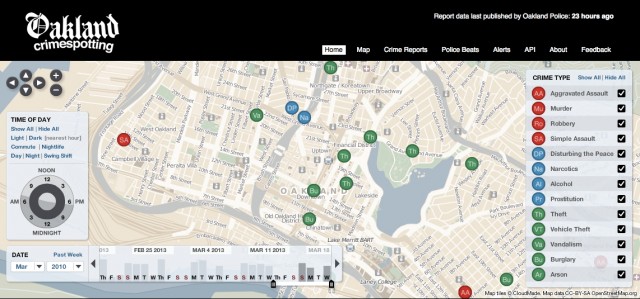
Enlarge / Founded in 2007, Oakland Crimespotting has been one of the best online crime tools in the city.
City trucks, city data
Still, if there's an argument against "solutionism," it's in Oakland's notable past example of what an open data-driven app can do with city data: Oakland Crimespotting.Created nearly six years ago, Michal Migurski set out to do what the City of Oakland and the OPD still effectively can’t: tell people where and when crimes are happening. Even now, the OPD’s website produces frustrating statistics (in PDF format!) about the city in aggregate. For a long time, it was nearly impossible to examine what crimes were happening where and when based on the OPD's website interfaces. Although it's become easier to get official information as of January 2013 due to a new open government portal, it's not a result of anything the OPD did. (Of course, as an Oakland resident, I’d much rather the OPD spend its time solving violent crimes than worrying about open data.)
So back before “open data” was a buzzword, Migurski sprung into action. He built an actually useful tool that ordinary citizens could understand. (I still have an e-mail alert to show me all crimes that happen within a quarter-mile of my front door.) He was inspired by the 2007 tragic murder of local journalist Chauncey Bailey in the downtown core of the city, less than a mile from the OPD's headquarters.
While Migurski has stepped away from the day-to-day of his side project, he still keeps an eye on his site—and on projects like Code for America. When asked what he thinks of the recent efforts to open up city data, he put it succinctly. "I think it's fucking great. [We need] people who believe that government doesn't have to suck natively.”
He went on about the potential benefits of open data: “One of the core tenets is that you never really know what’s going to be useful,” he said over coffee. “With Oakland Crimespotting, we were on the heels of Chicago Crime [a similar Chicago crime site]—we just knew that crime was going to be a major hot button issue. It’s really easy to imagine what would be useful, but there's whole other tranches of data that you have no idea how it would be useful and when you want to do something you don’t want to have to go chasing after it.”
Currently, Migurski said, Oakland has a “vendor-ocracy” for tech projects like many other municipalities. Few civil-servants really take ownership of a city’s tech plans, but rather feel more comfortable putting their technological trust in the hands of Oracle or Motorola. In other words, cities are customers first.
“Getting dataset records for everything that the city knows about would be huge,” the local activist said. “The long game, to me, is that cities should be good at this stuff. The same way that the city has dudes with green trucks maintaining parks—the city should take that same approach to data, that it's not a crazy thing that you pay a lot of money for.”
Bringing experience
CFA and Oakland have more going in their favor than a precedent, this partnership has the added benefit of a CFA alumnus in the same city.Eddie Tejeda is a friendly, bearded, bespectacled man who seems very at ease in both the worlds of technology and government. He served as a CFA fellow in New Orleans in 2012 and after a year of working, Tejeda and his team produced BlightStatus, an elegant way for city officials and citizens to monitor the status of a given property. Starting this year, after Tejeda and his two colleagues had finished their CFA fellowship, they started a company called Civic Industries to contract with other cities to build and maintain similar projects.
Tejeda has become one of the primary local mentors for Oakland’s CFA trio, both as an alumnus of the program and as a newly minted member of the city’s Public Ethics Commission. He explained that when he was working last year in New Orleans, as in any city, there are always similar problems with respect to making open data and related apps actually happen.
“For a long time it was like: ‘OK, [we] have an idea, how do we get the data? Where does the data exist?'” he told Ars. “There are barriers—we have to go through this person who is on vacation; they have the password. So that took a month, the bureaucracy. And now we’re part of the bureaucracy.”
BlightStatus could point the way forward for what the Code for America fellows come up with—a tracking system where everyone can see what the status of a given request is, and why it hasn’t been fulfilled yet. “[We have the potential] to go into the guts of a city and repair that city from the inside-out,” Tejeda said.
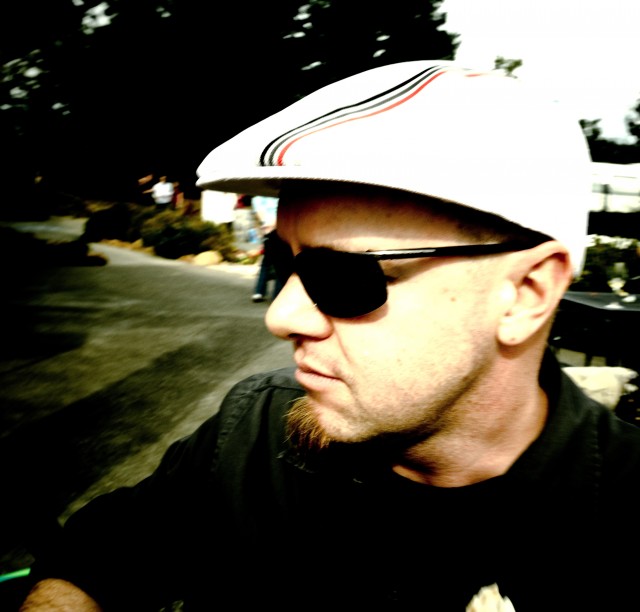
Enlarge / Steve Spiker is a "co-captain" of OpenOakland.
An Aussie in Oakland
Tejeda is also one of the “co-captains” of OpenOakland, a “brigade” that operates under the imprimatur of CFA but remains distinct from the fellowship. Essentially, the brigade can largely do whatever it wants as a civic organization, but it receives funding, branding, and some organization from CFA headquarters in San Francisco.Brigades can be founded in any city—in this case, it just so happens that OpenOakland and the arrival of its CFA fellows happened around roughly the same time. Tejeda's co-captain is Steve “Spike” Spiker, a newly naturalized American hailing originally from Australia who’s lived in Oakland for around seven years.
Spiker’s day job is the director of Research & Technology with Urban Strategies Council, a nonprofit based in Oakland—but he’s had longstanding ties to Code for America. In fact, he’s served as a mentor for both Philadelphia and New Orleans CFA fellows in the past. He’s helped both shepherd the CFA fellows as mentors, but he also makes sure that OpenOakland doesn’t work on projects that CFA is going to tackle.
“You've got to share the same goals and mission as CFA, so you can say: we buy this idea, these things, and we're going to meet and do this,” he said.
Spiker is also frustrated with the pace that the city currently moves.
“An ideal would be that the city realizes the potential for much more IT,” he said. “I’d like them to hire a CTO to tap the resources around data. They need someone to lead that body of work. That’s not a CIO. That person is in some ways a symbol that the city understands. When times are tight, you have to get smarter. They're leveraging those resources that they have. That's a big thing. The other would be that the city adopts open data legislation to go with the system that they have. That requires consideration of open source in contracting.”
While he did help to influence the opening of the city’s own open data portal, which debuted in January, his group had its own portal for a few months before. (He's also drafted model legislation, both as an executive directive and as a resolution.)
Spiker also pointed to Oakland Crimespotting as a key early example of what open data can look like in a fully formed application. He said that a few years ago when he presented it to Oakland’s City Council, “half the city councilors” didn’t like it. Why?
“Because they couldn't compare their district to another district,” he said. “That was part of the motivator because it's a great way to take real-time data over time, which is exactly what every Neighborhood Crime Police Council want to do. The lack of data was a big inhibitor to their ability to making decisions. Data is not a wonky, geeky issue, it's a very big pragmatic issue.”
The affable Australian-American has been key in organizing not only the weekly hack events, but also a recent “Open Data Hackathon.” Held just last month at an East Oakland library, the hackathon didn’t immediately produce very much that was actually useful, much less usable.
Similarly, there doesn’t seem to be much (so far) that has come out of the weekly events at City Hall either, with perhaps two exceptions: "Early Oakland," (which began at the Hackathon) lets locals find early childhood services, and “Find Your Beat,” allows anyone to determine what OPD zone they’re in.
As Spiker himself wrote in a recent blog post:
We have a huge list of all the different Yahoo groups where they communicate if we’re interested, but how, just how do you find out what beat you are in?For now, OpenOakland and the CFA fellows have a long road ahead of them. There have yet to be any really good, locally produced examples that have made a compelling demonstration of the use of such data, and more importantly, why such an application would actually matter.
The city’s current answer: use this incredibly horrible PDF document to clumsily guess. Seriously. I swear the city had something better in the past, but this is how you are meant to find and connect to your "local" group. Even ignoring its purpose, this is one of the worst maps I’ve ever seen in Oakland.
The man from central Australia also makes a compelling case for another issue (beyond crime) that the city can also easily understand: economic development.
“We’re talking about tech as job creator: that's big for Oakland,” Spiker added. “If your data is locked, you're a closed city and you're not open for business. If I'm looking to start a new business and I want to find space in one of those cities, right now I can find [all that] out in San Francisco online and I can look at crime around those areas. In Oakland, all I can find is crime data. That's a really fucking big deal if Oakland wants retail and wants to increase its tax base. If you want to do something, you don't want to have to drag your ass to City Hall and find the records that you need—that reality is a joke.”
In the end, it's hard to know what the Oakland fellows' project will look like over the next few months. As their time is limited (they have to be entirely wrapped up by the end of November 2013), they need to start coding—fast. They expect to have a minimum viable product sometime within the next month or so.
With Spiker and Tejeda's help (not to mention their own ongoing work), CFA's public records request portal could end up looking a lot like Tejeda's BlightStatus, an easy-to-understand progress-bar-style site where such requests' progress can be checked. For now, it's hard to know exactly what they'll come up with.
Another advantage that Oakland has over the other CFA cities this year—with perhaps the exception of San Francisco, CFA’s own home city—two out of the three Oakland fellows actually live in Oakland. (Only Richa Agarwal doesn’t live in Oakland.) After all, not only is downtown Oakland a 30-minute subway ride away from the Code for America offices, but they seem to be committed beyond the 2013 scope of the project.
“I live here, I'm not leaving—I have to deliver,” Cristina said.



No comments:
Post a Comment